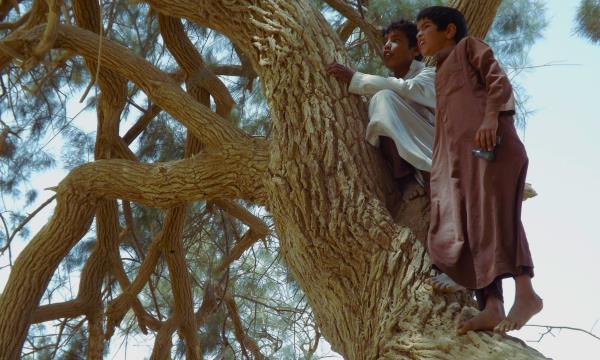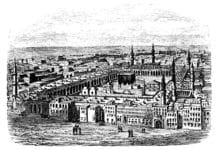“An adolescent from Quraysh came to the Prophet (peace be upon him) to ask him for permission for adultery. However, the Companions wanted to beat him because of his boldness to the Prophet (peace be upon him), but the Prophet (peace be upon him) had another opinion. He said to him: Come closer. The young man came closer. The Prophet (peace be upon him) said: Would you like it (unlawful sex) for your mother? He said: No, by Allah, may I be ransomed for you. The Prophet (peace be upon him) said: Neither do the people like it for their mothers. The Prophet said: Would you like it for your daughter? He said: No, by Allah, may I be ransomed for you. The Prophet (peace be upon him) said: Neither do the people like it for their daughters. The Prophet said: Would you like it for your sister? He said: No, by Allah, may I be ransomed for you. The Prophet (peace be upon him) said: Neither do the people like it for their sisters. The Prophet (peace be upon him) said: Would you like it for your paternal aunt? He said: No, by Allah, O Allah’s Messenger! May I be ransomed for you. The Prophet said (peace be upon him), Neither do the people like it for their paternal aunts. The Prophet (peace be upon him) said: Neither do the people like it for their maternal aunts. Then the Prophet put his hand on him and said: O Allah, forgive his sin, purify his heart, and guard his chastity. After that the young man never paid attention to anything of that nature.”[1]
 The Prophet (peace be upon him) treated him nicely and kindly and thought well of him to prove that goodness is hidden down inside him and that evil is something casual. He kept on arguing with him until he was convinced and his heart rejected the idea of adultery, moreover the boy won the supplication of the Prophet to him. Some people may say: That man did not commit adultery, so he is more entitled to be treated nicely instead of impoliteness. Listen to this example: The Ghamadi woman who had committed adultery while she was married then got pregnant. She came to the Prophet (peace be upon him) to purify her by executing the Prescribed punishment. She kept on asking for purification until the Prophet (peace be upon him) stoned her. When Khalid ibn Al Walid said a statement about her, the Prophet (peace be upon him) said to him: Do you insult her, Khalid? By Allah, she has repented in a way if repentance is divided into seventy houses of Medina, it will be enough for them. Would you think that she would do something better than sacrificing herself for the sake of Allah (Glory be to Him)?[2]
The Prophet (peace be upon him) treated him nicely and kindly and thought well of him to prove that goodness is hidden down inside him and that evil is something casual. He kept on arguing with him until he was convinced and his heart rejected the idea of adultery, moreover the boy won the supplication of the Prophet to him. Some people may say: That man did not commit adultery, so he is more entitled to be treated nicely instead of impoliteness. Listen to this example: The Ghamadi woman who had committed adultery while she was married then got pregnant. She came to the Prophet (peace be upon him) to purify her by executing the Prescribed punishment. She kept on asking for purification until the Prophet (peace be upon him) stoned her. When Khalid ibn Al Walid said a statement about her, the Prophet (peace be upon him) said to him: Do you insult her, Khalid? By Allah, she has repented in a way if repentance is divided into seventy houses of Medina, it will be enough for them. Would you think that she would do something better than sacrificing herself for the sake of Allah (Glory be to Him)?[2]
Another example is the Companion who used to drink wine and the Prophet (peace be upon him) commanded the Companions not to curse him so as not to help Satan against him.[3][4] It was reported that a Bedouin came to the Prophet and asked for something, and the Prophet gave him something, and asked: “Did I treat you well?” The Bedouin replied: “No, you have not treated me well.” Upon hearing this, Muslims got angry and advanced towards him. The Prophet made a sign to stop them. Then he got up and went to his house and gave him some more gift, and again asked: “Did I treat you well?” He replied: “Yes, may Allah grant prosperity to your family.” The Prophet said to him: “Whatever you have said to me, is alright in its place, but my Companions are angry in regard to you, if you like, you may repeat before them whatever you have said to me so that the anger from their hearts may be removed.” He said that it was agreeable to him. When the morning came, he came again, and the Prophet pointed towards him and said: “According to what this Arab had said, I gave him something more, and now he says that he is happy and pleased. Is not that so?” The Bedouin replied: “Yes, may Allah grant prosperity to your family.” Then Allah’s Messenger said: “My example and that of this man is like a man whose she-camel has been lost and the people ran after it to catch, but the animal was more startled; so that man told his companions: ‘Leave me and my she-camel alone, I know its ways more and I can bring it to the right path,’ Accordingly he lifted some grass from the ground in his two hands and showed it to the she-camel. It returned and sat near his feet, He tied the mount on its back and rode it,” “If I were to leave you when he was using foul language, you would have killed him and he would have been sent to hell.”[5]
This is Islam, a realistic system when dealing with human souls and reality, and does not impose burden upon them beyond their capacity or ask them to cancel their humanity to be Muslims. However, it deals with them as humans and asks them to do what humans can do, and how to face the moment of weakness to promote oneself to the required level. [6]
 Part of Prophet’s tolerance as Anas ibn Malik, the servant of the Prophet (peace be upon him), narrated: “I served the Prophet (peace be upon him) for ten years, and he never said to me: “Uf” (a minor harsh word denoting impatience) and never blamed me by saying: Why did you do so or why didn’t you do so?”[7]
Part of Prophet’s tolerance as Anas ibn Malik, the servant of the Prophet (peace be upon him), narrated: “I served the Prophet (peace be upon him) for ten years, and he never said to me: “Uf” (a minor harsh word denoting impatience) and never blamed me by saying: Why did you do so or why didn’t you do so?”[7]
This is against the human nature and can only be achieved by a prophet about whom Allah said: “And verily, you (O Muhammad peace be upon him) are on an exalted standard of character.” [Surat Al Qalam: 4].
`A’ishah (may Allah be pleased with her) said: “The Messenger of Allah (peace be upon him) never hit anything with his hand neither a servant nor a woman but of course, he did fight in the Cause of Allah. He never took revenge upon anyone for the wrong done to him, but of course, he exacted retribution for the sake of Allah in case the Injunctions of Allah about unlawful acts were violated.”[8]
Trustworthy narrators reported that the Messenger of Allah (peace be upon him) used to accept the excuse of an apologizer, did not face a person with something he hated, and when he was told that one of his Companions did something wrong, he would advise people generally saying: “Why people do such and such?” without mentioning the name of the mistaken then guided the mistaken to the right to teach the mistaken and non-mistaken.
He did not like that people stand for him and used to sit whenever he found a room [without making people to stand for him to sit]. The Prophet (peace be upon him) used to say: “Do not exaggerate in praising me as the Christians praised the son of Mary, for I am only a Slave. So, call me the Slave of Allah and His Messenger.”[9]
He used to go to markets and guide the people to integrity, and he forbad people from cheating in dealings. He used to be smiley to everyone who meets or sits with him to the extent that his Companions would think that he is the closest to him. He used to draw nearer those who embraced Islam first or those hastened to Jihad first even if they were the lowest of people. Moreover, he used to consult people of opinions in political and war matters or in worldly affairs and would accept their opinions when he sees them correct as happened in the battle of Badr and others. He used to participate with his Companions in what they were doing and bear the same burdens they bore as happened in the Battle of the Trench when he carried dust with the Companions from the trench they were digging around Medina as Salman Al Farisy advised so as not to leave Medina defenseless.
So, do you think there has been someone more generous and more modest than the Prophet (peace be upon him) when he was doing these matters with his Companions who were ready to sacrifice everything for him?[10]
Imam Ahmad reported with his own chain of transmission on the authority of Al Aswad ibn Sari` that the Prophet (peace be upon him) brought a prisoner of war who said: “O Allah, I repent to You and I do not repent to Muhammad.” Thereupon, the Prophet (peace be upon him) said: He knew the truth and its people.[11] So, look at his tolerance with the rude person and how did he behave him as Al Bukhari reported with his chain of transmission that Anas (may Allah be pleased with him) narrated: “I was walking with the Prophet (peace be upon him) who was wearing a Najrani ou ter garment with a thick hem, a bedouin came upon the Prophet and pulled his garment so violently that I could recognize the impress of the hem of the garment on his shoulder, caused by the violence of his pull. Then the bedouin said: “Order for me something from Allah’s Fortune which you have.” The Prophet turned to him and smiled, and ordered that a gift be given to him.”[12]
ter garment with a thick hem, a bedouin came upon the Prophet and pulled his garment so violently that I could recognize the impress of the hem of the garment on his shoulder, caused by the violence of his pull. Then the bedouin said: “Order for me something from Allah’s Fortune which you have.” The Prophet turned to him and smiled, and ordered that a gift be given to him.”[12]
Al Hakim and others reported on the authority of Zayd ibn Sa`nah, who was one of the Jews who embraced Islam, that he said: I have known all the signs of prophethood in the face of Muhammad (peace be upon him) except two signs, which were: Would his tolerance overpower his ignorance? And rudeness would increase his forbearance. So, I used to treat him nicely so that I would socialize with him and know these two qualities. So, once he bought fresh dates from me and we delayed the payment for a fixed time. When the term of the payment was about to end, I came to him to demand repayment of my debt two or three days before it was due. I approached him (the Prophet) and gripped him by the shirt and cloak. I looked at him with a harsh face and said: ‘O Muhammad, will you not pay my dues? By God, I have not known the House of `Abdul-Muttalib to be ones who evade payment, and I have known that from living amongst you. I looked towards `Umar to find that his eyes were rolling like a round ship. He then gazed at me and said: ‘O enemy of Allah, are you addressing the Messenger of Allah with what I am hearing and doing unto him what I am seeing? [I swear] by He who has sent him with the Truth that, if not for what I fear I could sacrifice, I would strike your head with my sword.’ The Messenger of Allah (peace be upon him) was looking at `Umar with serenity and patience, and then said: ‘O `Umar, myself and him were in greater need in something other than this [wrath]; that you command me with good fulfillment [of my debt] and command him with good manners in demanding his dues. `Umar, take him and give him his due and increase it by twenty Sa’s of dates in compensation for threatening him.” Zayd said: `Umar escorted me and granted my dues and added twenty Sa`s of dates. I said: ‘What is this increase, O `Umar?’ He said: ‘The Messenger of Allah instructed that I increase [your dues] in place of threatening you.’ I said: ‘And do you know me, O `Umar?’ He said: ‘No, who are you?’ I said: ‘I am Zayd ibn Sa`nah.’ He said: ‘The rabbi?’ I said: ‘The rabbi.’ He said: ‘So what led you to do unto the Messenger of Allah (peace be upon him) what you did and say unto him what you said?’ I said: ‘O `Umar, there was nothing of the signs of prophethood that  I did not identify in the face of the Messenger of Allah save two [qualities] that I did not know of him; his forbearance overpowers his anger and the anger practiced unto him only increases his forbearance. Now I have witnessed them. So bear witness O `Umar that I accept Allah as lord, Islam as religion, and Muhammad as Prophet.”[13]
I did not identify in the face of the Messenger of Allah save two [qualities] that I did not know of him; his forbearance overpowers his anger and the anger practiced unto him only increases his forbearance. Now I have witnessed them. So bear witness O `Umar that I accept Allah as lord, Islam as religion, and Muhammad as Prophet.”[13]
You cannot find something better than pardon when you are able to execute punishment, modesty at victory, and tolerance and generosity with oppressors; all these qualities were embodied in the Prophet (peace be upon him) during the opening of Makkah.[14]
[1] Reported by Ahmad, (vol. 5. P. 256) and At-Tabarany in Al Mu`jam Al Kabir and its narrators are the narrators of the Hadith compiled by Al-Bukhari and/or Muslim as was reported in Majma` Az-Zawa’id Vol. 1, P. 129.
[2] Reported by Muslim in the book of the Prescribed Punishment, chapter on he who admits against himself for committing adultery, Vol. 2, P. 1324, and Ahmad Vol. 4, P. 430.
[3] Reported by Al Bukhari in the book of the Prescribed Punishments, chapter on Hadiths reported about the reprehensibility of cursing alcohol drinker and that he is not an apostate, Vol. 4, P. 171 – 172.
[4] Islamic awakening between denial and extremism, P. 226 – 227 with paraphrasing.
[5] Reported by Al Bazzar, and Al Haythamy said in Majma` Az-Zawa’id, vol. 9, P. 16: Reported by Al Bukhari and the Hadith contains Ibrahim ibn Aban whose narrations are rejected.
[6] Are we Muslims? for prof. Muhammad Qutb, P. 66 – 67, with paraphrasing, Dar Al Shoruk 1983.
[7] Reported by Abu Dawud in the book of manners, chapter on of the forbearance and manners of the Prophet (peace be upon him), vol. 4, P. 247 with the same narration, and did not comment on the narrator.
[8]Reported by Abu Dawud in the book of literature of exceeding the proper limits, vol. 2, P. 250, and did not comment on the narrator. Reported by Ibn Majah in the book of marriage, chapter on beating women (Vol. 1), (p. 638)
Reported by Ad-Darimy in the book of marriage, chapter on forbidding the beat of women(Vol. 2, P. 147).
[9] Reported by Al Bukhari in the book of “the Beginning of creation,” chapter on “And mention in the book Mary [Surat Maryam: 16],” Vol. 2, P. 256, and Ahmad Vol. 1, P. 23.
[10] The favor of the Most Compassionate from the Shari`ah of the Qur’an by Mustafa Muhammad Al Hadidy Al Tayr (P. 74 – 76) with paraphrasing. The edition of the Public Authority for the princely presses, 1985.
[11] Reported by Imam Ahmad vol. 3, P. 43. Al Haythamy said in Az-Zawa’id (Vol. 10, P. 199): Reported by Imam Ahmad and At-Tabarany and the Hadith contains Muhammad ibn Mus`ab whom Imam Ahmad graded him as trustworthy, whereas others graded him as weak, but the rest narrators are Rijal As-Sahih (narrators of Hadith compiled by Al Bukhari and/or Muslim).
[12] Reported by Al Bukhari in the book of clothes, chapter on Purdahs, garment, and cloak, Vol.4, P. 28.
[13] Reported by Al Hakim in Al Mustadrak, Vol. 3, P. 604 – 605, Dar Al Ma`arif edition,Beirut. Reported by Ibn Majah with the same in the book of attributes, chapter on the one who holds the truth has power Vol. 2, P. 810, Scientific Library edition with Beirut, and Adh-Dhahaby said in “At-Talkhis” Authentic. And reported by Ahmad (3/19, 61).
[14] The favor of the Most Compassionate from the Shari`ah of the Qur’an (P. 76, 8) with paraphrasing.









